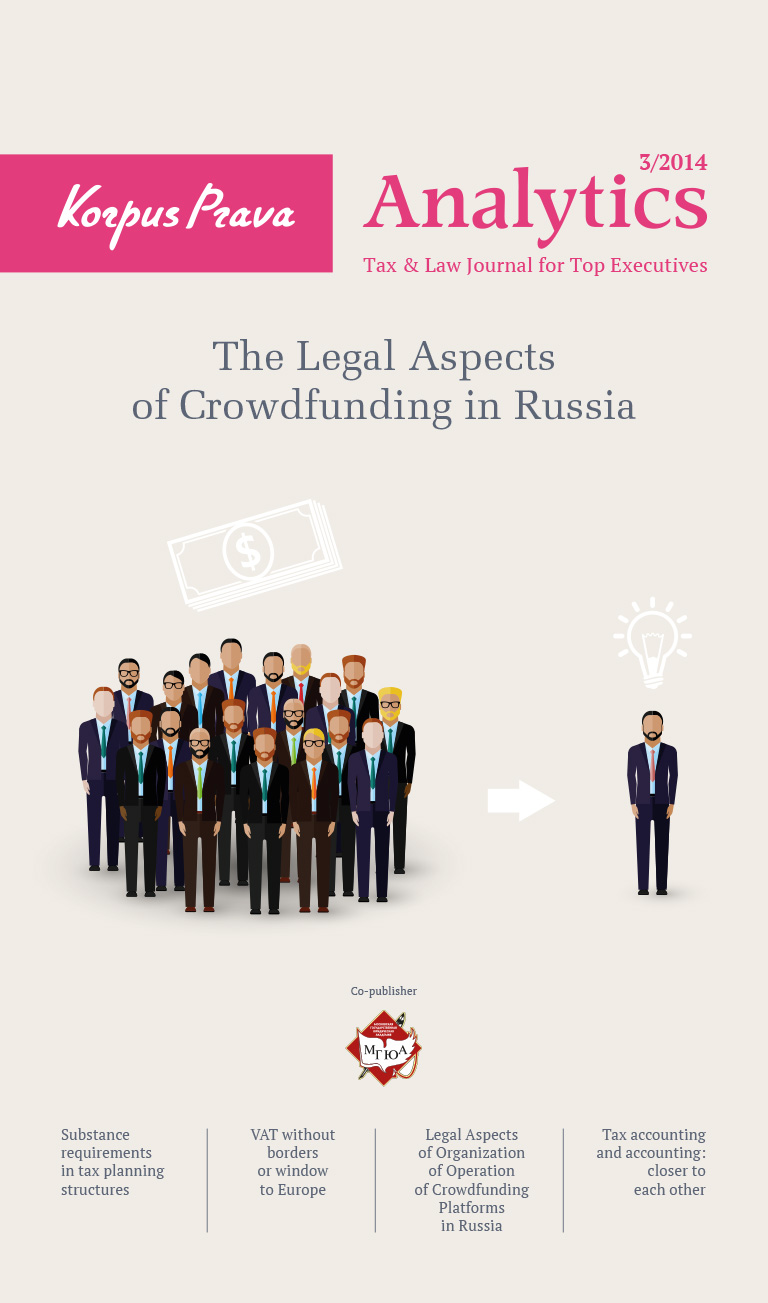- Cyprus Citizenship Scheme for Foreign Investors
- Squeezed But Pleased: Taxation of Passive Income in the European Union
- VAT Without Borders or Window to Europe
- Legal Aspects of Organization of Operation of Crowdfunding Platforms in Russia
- Substance Requirements in Tax Planning Structures
- “Deposit Splitting” of Individuals. Legal Civil and Criminal Aspects
Squeezed But Pleased: Taxation of Passive Income in the European Union
In recent years a trend towards registration of companies in the European jurisdictions with middle-income tax, for example, the Netherlands, Ireland, has been noticed. This is due to the fact that often such states and Russia signed a treaty on the avoidance of double taxation, the advantages of which can be used in planning taxation of Russian companies. In turn, a company incorporated in the EU member state may require establishment of a subsidiary in another EU member state. The relevance of knowledge about taxation of dividends and other passive income payable from one EU member state to another EU member state is obvious.
Dividends of related companies
In accordance with the idea of formation of a single European community the Council of the European Union adopted the Directive 2011/96/EU of 30.11.2011 establishing a limit on levying withholding tax on dividends payable by a subsidiary of parent company located in another EU member state1. To obtain such benefits both companies must meet the following criteria:
- Both the parent and subsidiary companies are tax residents of the state of their location;
- None of the companies is entitled to exemption from the profits tax in accordance with the national legislation of the state of their location;
- The minimum share of direct participation in the equity of the subsidiary located in another EU member state is 10% (hereinafter – qualified participation), or
- Has qualified participation in the capital of the subsidiary through a permanent representative office situated in another, rather than the EU member state of the subsidiary2.
Under specified conditions the state of location of the parent company is obliged to provide one of the following benefits:
- Payment of dividends received by the company or its permanent representative office, obtained from other EU member state;
- Provision to the company or its permanent representative office a tax privilege in the amount of tax actually paid on the portion of the profits out of which the subsidiary paid dividends in proportion to the share of the parent company3.
In most cases, the latter measure is implemented by providing a tax deduction or a tax credit in the state of location of the parent company4.
As a result of implementation of the Directive, just one of the three levels of taxation of dividends remains:

The Directive does not affect the application of national legislation and international treaties aimed at reducing or eliminating double taxation of dividends. When calculating the tax burden upon a specific payment of dividends the provisions of these sources of law, which can establish features of application of the EU law, shall also be taken into account.
In the summer 2014, the Council of the European Union approved the amendments to the Directive 2011/96/EU aimed at combating payment of tax using hybrid loans – a financial instrument specifically designed for the illegal use of the Directive5. The hybrid loan combines the features of the debt obligation and securities. Thus the legislation of some EU member states treats hybrid loan as a loan, while the legislation of other states – as a security. If the “right” pair of jurisdictions is selected, payments on hybrid loan reduce the tax base as expenses in the form of interests on loan (in the state of the subsidiary) and are exempt from taxation as dividends in the state of the parent company. Thus, full exemption from the profits tax is achieved.

To combat hybrid loans it is assumed to limit the norm of exemption of dividends received by the parent company, if the amount of such payment was deductible in the state of the subsidiary.
The EU member states are obliged to implement by 31 December 2015 into the national law norms that impede the use of hybrid loans for the purpose of tax evasion.
Interests and royalties of related companies
The interests and royalties paid between related companies located in different EU member states shall be exempt from withholding tax under the following conditions:
- Both companies: the company-payer and the company- payee are tax residents of different EU member states;
- Both companies are payers of the profits tax;
- Company 1 directly owns 25% of shares of company 2 or company 3 directly owns 25% shares in the company 1 and company 26.
The latter criterion relating to the percentage of corporate participation can be changed by national law of the EU member states.
Exemption from withholding tax applies to interests payable by company 1 to the permanent representative office of company 2 located in an EU member state, other than the state of company 17.
Exemption does not apply to interest payments on the following obligations:
- Debt obligations, according to which the lender has the right to participate in the debtor’s profits;
- Debt obligations, according to which the lender can exchange the right to claim interest payments to participate in the debtor’s profits;
- Debt obligations, which do not provide for payment of principal or provide for its payment after more than 50 years8.
- Article 5 of the EU Council Directive 2011/96/EU of 30.11.2011
- Article 2, point 1 of article 3 of the EU Council Directive 2011/96/EU of 30.11.2011
- Point 1 of article 2 of the EU Council Directive 2011/96/EU of 30.11.2011
- Howard R. Hull “EC Parent-Subsidiary Directive in Switzerland”, Der Schweizer Treuhänder 3/05, p.178.
- http://europa.eu/rapid/press-release_MEMO-13-1040_en.htm
- Article 3 of the EU Council Directive 2003/49/EC of 03.06.2003
- Point 1 of article 1 of the EU Council Directive 2003/49/EC of 03.06.2003
- Point 1 of article 4 of the EU Council Directive 2003/49/EC of 03.06.2003
Your subscription to our journal will definitely boost the efficiency of your specialists and downsize your expenses for consultants.
The journal is available free of charge in the electronic version.
Free Download

